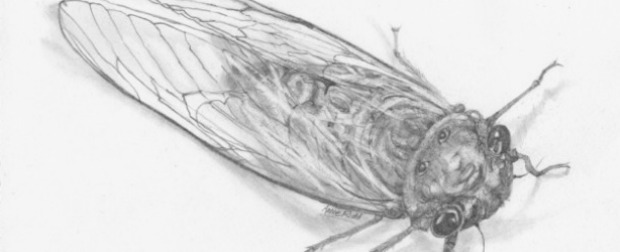You have no items in your cart. Want to get some nice things?
Go shopping
When she steps outside it is there. Cracked brown pieces like the pieces of a dry husk, scattered on the ground in front of her apartment complex. It looks to her as if a cicada has shed its shell, but it is far too large. Somebody has already broken it. Perhaps a child cycling through on his way to school.
As she hurries to catch the bus, she thinks how the cry of the cicadas has amplified these past few days. The cicadas fill the hot Seoul nights with noise. They are the sound of summer, emerging from years of slumber beneath the earth’s membrane to call and find a mate. But it is impossible to sleep amidst their amorous chorus. In waves it comes: their shrill and zealous song, receding and swelling.
City life has made them louder, the scientists say. They are clamouring to be heard above the urban din.
They can be found largely stationary, reverberating on the trunk of a tree, else crawling along so slowly that it is as if each movement is strenuous. They are plump little creatures who spend the greatest portion of their lives tucked away in sleepy earth before finally rising, casting away their shells to engage with adulthood, struggling to be noticed amongst the sounds of the city in their quest to find their elusive other half.
At Yonsei, the girl sits next to a new classmate who has just joined for the term. He has a slightly apologetic face with bulbous, bloodshot eyes quite widely spaced apart.
But there is a pleasant resonance in his voice. He speaks perfectly from the belly and his voice is rich and sonorous. She admires this because she herself speaks too much from the throat. She thinks her voice is too high-pitched and fragile, and she would like to change it.
Her classmate is quite a still and sedentary person, a little fleshy around the middle, who moves very slowly. Each step seems considered. When he walks it looks laborious but it also gives the impression that he cannot possibly have a vicious heart. He must be a kind, placid, gentle person, she thinks.
Today he is looking strangely fresh-faced and pearly as though he has given his face an especially good scrub, exfoliating away the old skin cells for a new layer to shine through. He looks somehow more expansive and mature, his flesh beaming with new life.
She asks him how his weekend was and for some reason he blushes.
The class passes slowly, as do all the classes that day. She is sleep-deprived and unable to concentrate. She thinks of the cicadas that live in the tree across from her bedroom window, how the vibrations that sound from their hollow abdomens have been disturbing her sleep for almost a week. They are so loud, she thinks, the tree must contain cicadas of monstrous proportions.
When she returns home the husk is still there, decaying beneath the branches. The pieces have been further trampled on. She kicks one of the pieces on her way into the apartment and thinks again how it reminds her of the shell of a cicada, except that it cannot be, it is too large.
That night the chorus is louder than ever. She sits up in bed with a scowl. It is as though she is being serenaded by a particularly persistent and cacophonous lover. She glares at the tree outside her window, from which those relentless waves of yearning emanate.
But something is not quite right.
She narrows her eyes. She edges out of bed and slides the window open; leans out to discern what it is. And immediately steps back.
Through the leaves emerges the large, imploring, bloodshot eyes of her classmate; his shy and wistful face.
He moves slowly. He crawls along the branches towards her, the leaves rustling beside the loud and urgent buzzing of his abdomen.





